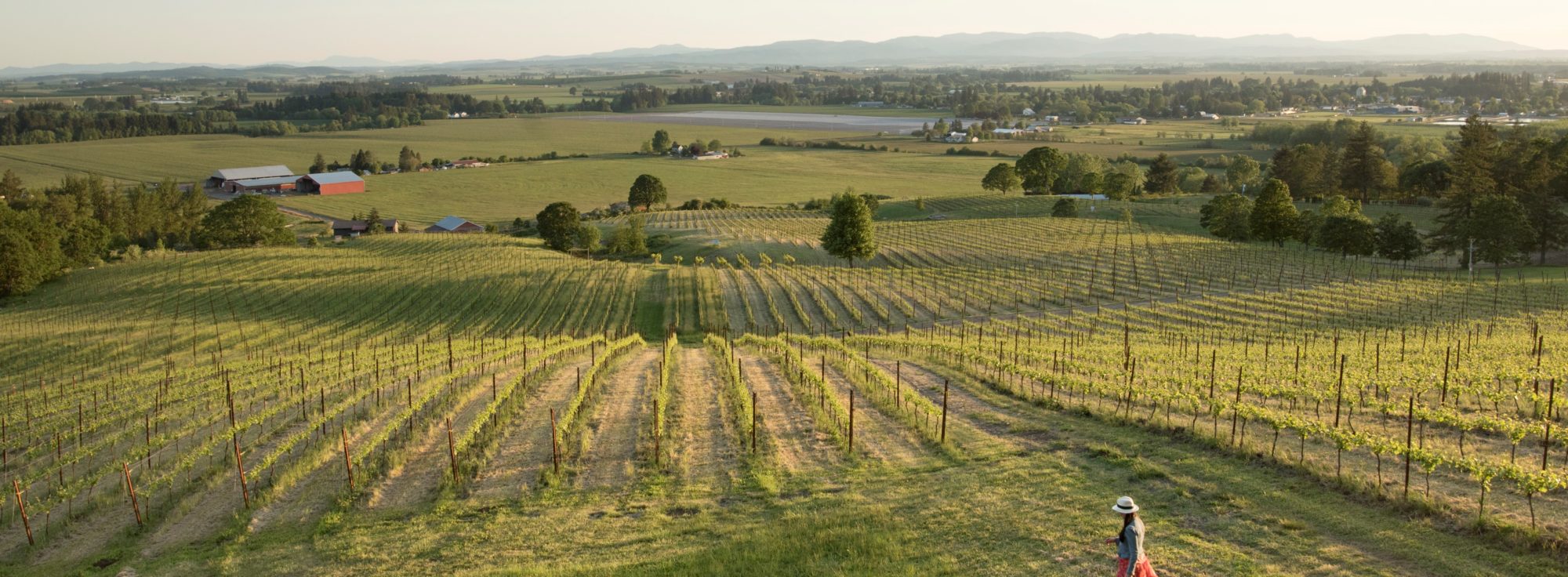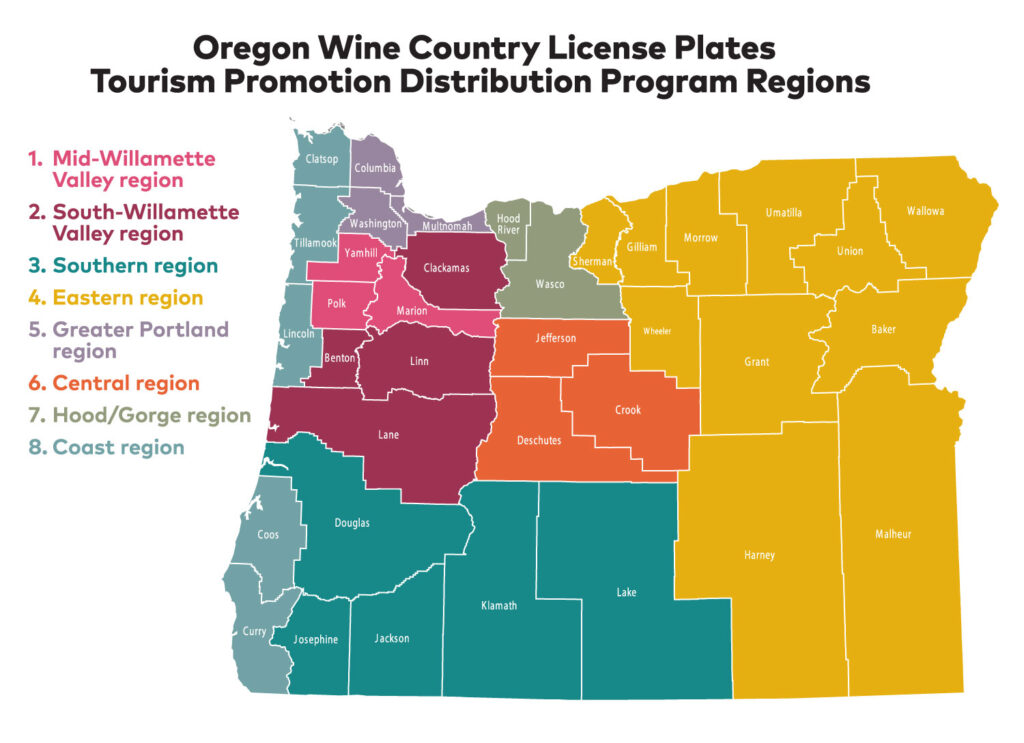
Oregon Wine Country License Plates Tourism Promotion Distribution
Travel Oregon administers this funding program which supports designated regional tourism promotion agencies for the purpose of wine and culinary tourism promotion.
Overview
Funding for the program originates from a portion of sales of the Oregon Wine Country license plate. Funding amounts are calculated based on the amount of acreage each region uses for wine grape production.
Download the Oregon Wine Country License Plates Tourism Promotion Guidelines.
Eligibility
The Oregon legislature has designated and defined these regions as eligible program recipients:
- Region 1, also known as The Mid-Willamette Valley region, consisting of Marion, Polk and Yamhill Counties
- Region 2, also known as the South-Willamette Valley region, consisting of Lane, Linn, Benton and Clackamas Counties
- Region 3, also known as the Southern region, consisting of Douglas, Josephine, Jackson, Klamath and Lake Counties
- Region 4, also known as the Eastern region, consisting of Sherman, Gilliam, Morrow, Umatilla, Union, Wallowa, Wheeler, Grant, Harney, Baker and Malheur Counties
- Region 5, also known as Greater Portland region, consisting of Columbia, Multnomah and Washington Counties
- Region 6, also known as the Central region, consisting of Jefferson, Deschutes and Crook Counties
- Region 7, also known as the Hood/Gorge region, consisting of Hood River and Wasco Counties
- Region 8, also known as the Coast region, consisting of Clatsop, Tillamook, Lincoln, Coos and Curry Counties
Industry stakeholders interested in the program are encouraged to connect with their region’s designated tourism agency at any time throughout the year.
Regional Tourism Agency Contacts:
- Region 1 – Mid-Willamette Valley region: Travel Salem, Kara Kuh
- Region 2 – South-Willamette Valley region: Willamette Valley Visitors Association, Tori Middelstadt
- Region 3 – Southern region: Travel Southern Oregon, Bob Hackett
- Region 4 – Eastern region: Eastern Oregon Visitors Association, Alana Carollo
- Region 5 – Greater Portland region: Washington County Visitors Association, Dave Parulo and Ariel Lessens
- Region 6 – Central region: Visit Central Oregon, Kristine McConnell
- Region 7 – Hood/Gorge region: Oregon’s Mt. Hood Territory, Ithaca Janzen
- Region 8 – Coast region: Oregon Coast Visitors Association, Marcus Hinz
Eligible Projects and Activities
Designated Tourism Agency contacts must comply with the requirements of all applicable Oregon Revised Statutes and Administrative Rules, including definitions as cited in ORS 320.300(7) stating that “Tourism promotion” means any of the following activities:
(a) Advertising, publicizing or distributing information for the purpose of attracting and welcoming tourists;
(b) Conducting strategic planning and research necessary to stimulate future tourism development;
(c) Operating tourism promotion agencies; and
(d) Marketing special events and festivals designed to attract tourists.
Program goals include the following:
- Optimize the benefits of regional tourism efforts to Oregon’s economy.
- Encourage regional tourism promotion and collaboration.
- Encourage leveraging of existing statewide and regional programs where beneficial.
Additional Benefits of Program Funding
This program’s funding can be used as matching funds for the Oregon Wine Country License Plates Matching Grant.
2025 – 27 Program Timeline
Regions will be notified of available funding in May 2025 and will be required to submit a proposal online by June 1, 2025, to show their planned usage of funds for 2025-2027.
Submitted plans showing how Regions intend to spend the funding will be reviewed by Travel Oregon and the Oregon Wine Board.
If a Region decides to roll dollars over to the next year to fund larger projects, Travel Oregon requires this request be made by email to dawns@traveloregon.com and michellew@traveloregon.com by June 1, 2025. The email must include the reason why funds will not be used in the upcoming distribution years.
Reporting Requirements
Recipients have 2 years to use the funding.
Quarterly Check-In meetings
Recipients are required to attend online, quarterly check-in meetings to make sure spending is on track for the year and to answer any questions.
- Q1 period: July – September / meeting held during last 2 weeks of November
- Q2 period: October – December / meeting during last 2 weeks of February
- Q3 period: January – March / meeting held during last 2 weeks of May
Annual Accomplishment Reports
Recipients must submit an annual year-end Accomplishment Report to Travel Oregon through Travel Oregon’s grants management platform. The annual year-end Accomplishment Report shall show proof of spending, a status update in the case of multi-year initiatives as well as results of return on investment anticipated in the marketing plan compared to actual results.
This report is due by July 31 annually on July 31, 2026, and July 31, 2027.
Submitted annual Accomplishment Reports will need to pass Travel Oregon’s review before additional funding will be issued.
